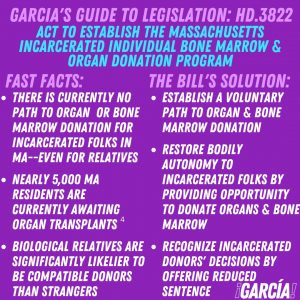latest
Massachusetts legislation will reduce sentence for incarcerated people if they donate bone marrow or organs

BOSTON – A new bill was filed last month on Beacon Hill that would reduce the amount of time convicted individuals would have to serve in Massachusetts if they donate a certain amount of marrow or organs.
Bill HD.3822, an Act to establish the Massachusetts incarcerated individual bone marrow and organ donation program, is sponsored by State Reps. Carlos González, 10th Hampden, Judith Garcia, 11th Suffolk, Bud Williams, 11th Hampden, and Russell Holmes, 6th Suffolk.
If passed, the Commissioner of the Department of Corrections would establish a Bone Marrow and Organ Donation Program within the Department of Correction and a Bone Marrow and Organ Donation Committee. The Bone Marrow and Organ Donation Program would allow eligible incarcerated individuals to gain not less than 60 and not more than 365 day reduction in the length of their committed sentence in Department of Corrections facilities, or House of Correction facilities on the condition that the incarcerated individual has donated bone marrow or organ(s).
The Bone Marrow and Organ Donation Committee would consist of five members: The Commissioner of the Department of Correction or their designee who will act as chair of the committee; the Medical Director of the Department of Corrections or their designee; a Bone Marrow and Organ Donation Specialist from a hospital within the Commonwealth or their designee; a representative of an organization advocating for bone marrow donations within the Commonwealth or their designee; and two appointments shall be made by the Governor to serve three-year terms and one of whom shall be a board member of an advocacy group advocating for the rights of incarcerated individuals, and one of whom shall be from the Massachusetts District Attorney’s Association.
The Bone Marrow and Organ Donation Committee would be responsible for the implementation and administration of the incarcerated individual Bone Marrow and Organ Donation program. The Bone Marrow and Organ Donation Committee would also be responsible for standards of eligibility for incarcerated individuals to participate and the amount of bone marrow and organ(s) donated to earn one’s sentence to be commuted.
Annual reports including actual amounts of bone marrow and organ(s) donated, and the estimated life-savings associated with said donations, would be filed with the Executive and Legislative branches of the Commonwealth. All costs associated with the Bone Marrow and Organ Donation Program would be paid for by the benefiting institutions of the program and their affiliates-not by the Department of Correction.
One of the opponents of the bill is new Bristol County Sheriff Paul Heroux.
“Reading the news coverage this week around the world of the proposal to give inmates early release in exchange for them signing up to be organ donors set off a lot of alarms in my head. Let me explain why.
“First, early release, or “good time” as it’s known around the Bristol County correctional facilities, is earned by inmates for participation in education, rehabilitation, substance-abuse and other programs that all share one common and extremely important goal: To give the inmates tools and knowledge to steer them away from crime upon release.
“It’s a good idea that’s shared in correctional operations across the globe.
“They are getting out early because the programs are decreasing the likelihood of them offending.
“So, my question is: What part of being an organ donor reduces the risk of recidivism?
“Nothing. There is no nexus, no common ground, between being an organ donor and being less likely to commit a crime.
“By awarding good time or early release without the rehabilitative component, it’s nothing more than a bribe, and corrections is not in the business of bribes. We’re in the business of inmate care, custody, control and rehabilitation.
“Early release? Good idea. Organ donation? Good idea. Getting good time for donating organs? Bad idea.”
One of the bill’s sponsors, Judith Garcia, released a graphic as to why she feels the legislation should pass.







Someone needs a brain
February 12, 2023 at 11:06 am
This is moronic